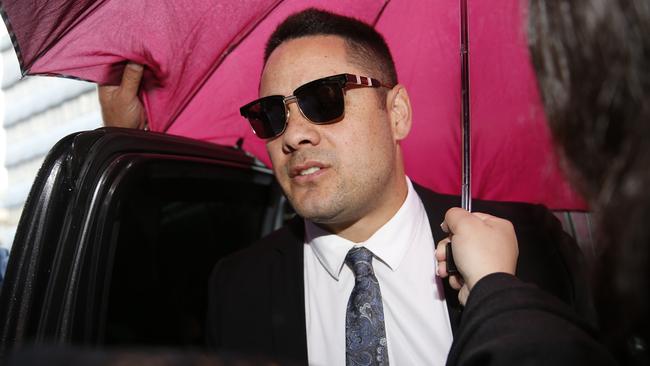
NRL clubs no longer need to pretend to repair broken footballers or just blatantly turn a blind eye to the very worst player behaviour.
When it was revealed on Thursday, during Jarryd Hayne’s sentencing for rape, that he had been close to signing a $500,000 deal with St George Illawarra, it spoke to a club culture of little care when it came to sexual assault allegations.
The fact the Dragons were due to sign him was disturbing because, at the time, it was public knowledge a US woman had alleged she had been raped by Hayne when he was playing in the NFL for the San Francisco 49ers.
She, like Hayne’s Australian victim, was allegedly left bloodied after a sexual act with the footballer.
The American woman said after meeting Hayne on a night out at San Jose bar, she became “heavily intoxicated” and ended up back with him at his apartment. She says there Hayne flipped her around and told her “no kissing” before she felt an “extremely sharp pain” in her vagina.
Legal documents state she woke naked and in a pool of blood the next day. Hayne was sued for sexual battery, battery, gender violence, intentional infliction of emotional distress and negligence in the US District court. Hayne and the woman eventually settled out of court.
This disturbing story of a woman left bloodied was out there. But still rugby league clubs circled Hayne and the Dragons wanted him.
The Dragons ripped up the Hayne offer on the day he was charged with the rape of an Australian woman. It was seemingly one rape allegation too many. Hayne was found guilty in March of sexually assaulting the then 26-year-old woman in 2018. On Thursday, he was sentenced to more than five years in jail. The former Eels star is appealing.
The NRL have come so far since that “summer of hell” in 2018 where both Hayne and Dragons star Jack de Belin were charged with rape. The Australian Rugby League Commission, its then chair Peter Beattie and key members Megan Davis and Peter V’landys, pushed for the no-fault stand-down policy and saw it implemented despite huge opposition from the Rugby League Players Association.
It is a policy that has been highly effective, stopping footballers accused of serious crimes against women and children from playing.
But there needs to be more done. The culture in some clubs needs an enormous shift.
It was Dragons players who considered striking back in 2019, because they were angry their star player and alleged rapist de Belin was sidelined under the NRL’s then tough new stand down rule.
De Belin had challenged the rule, stating it was a “restraint of trade”, and lost in the Federal Court. The Dragons footballers were furious and considered the public protest. “Watching Jack train and look better than any of the other players in training has an impact on the team,” coach Paul McGregor told Nine Newspapers last month.
The stand-down rule has rankled many, the RLPA spent $500,000 in arbitration opposing it, but the truth is, it has saved the NRL nearly $20 million in sponsorship. Not to mention respecting the victims when they do come forward.
While the stand-down policy is impressive, there’s more to be done to help curb player bad behaviour.
While there are clubs who have taken a tough stance on player behaviour in the past, like the Wests Tigers did with Matt Lodge (who was charged and found guilty of assaulting his then girlfriend and went on a drug-fuelled rampage in NYC where he stalked two women; telling them, “this is the night you will die”) there will always seemingly be another club willing to sign a troubled footballer. In Lodge’s case, it was the Broncos.
What the game needs is a unified code of conduct that prevents situations where a bad footballer is expelled from an NRL club only to be picked up by another club with lower standards or expectations of behaviour.
It’s 2021 and the “greatest game of all” doesn’t need broken, troubled, footballers. The game doesn’t need players that have degraded women in one way or another. It’s time for a zero-tolerance approach to bad behaviour. The game no longer needs to rehabilitate troubled domestic violence offenders such as Manly’s Addin Fonua-Blake.
Penrith’s Tyrone May, who was one of the first footballers to be sidelined under the stand-down policy after he filmed a woman against her will during a sexual act, still stars for the Panthers today.
May narrowly avoided jail after he was found guilty of filming the woman without her consent. He has never apologised to the victim and May has had his contract with the Panthers renewed. He has since given interviews about his tough childhood — the sympathy has been all his way.
And the woman, the victim? She is broken. With the videos of private sexual interactions, the vision of a man having anal sex with her while others stand around masturbating have been disseminated on porn sites.
One of the videos is titled “Boot the slut”. It shows men with their feet on her head while a man has sex with her.
Her friends have seen these videos, not to mention thousands of strangers who have seen them on Pornhub and xvideos.com. Again, she is broken by all this.
She has suffered “psychological injury” as well as anxiety, post-traumatic stress disorder and depression because of May’s actions in illegally filming and allegedly distributing the sex tapes. She is suing May for damages in the Supreme Court of NSW.
Still, May plays on like nothing has happened.
The question now has to be asked: does rugby league really need people like Tyrone May?




Rugby league needs to bin its “redemption” narrative.